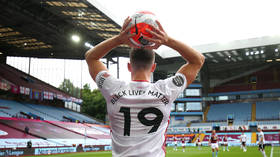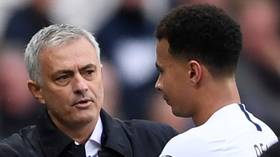Football and politics never mix well. Shirts emblazoned with 'Black Lives Matter' legitimise the movement's extreme aims

English football is right to tackle racism. But by endorsing the controversial manifesto of BLM, it’s upset some fans and breached FIFA’s own guidelines on politicizing the sport.
English football resumed hostilities this week and, as usual, matches were mired in controversy, not over the failing goal-line technology that denied Sheffield United against Aston Villa in the Premier League, but because all players wore shirts with Black Lives Matter emblazoned across the back, rather than their names.
No one, except the most pig-headed of racists, argues with the sentiment. But it’s such a politically loaded and controversial issue in the UK and elsewhere, of course, that football’s ruling authority’s decision to act in what appears to be such haste, and without any discussion with fans, could well backfire.
The fury among some, outraged at being corralled into a movement in which they’d prefer not to be involved, is palpable. Some have pledged never to buy season tickets again.
If West Ham players wear on their backs the name of an extremist group whose supporters have repeatedly desecrated the Cenotaph and Churchill's statue and attacked police officers then that's me done as a season ticket holder. I won't be the only one either. https://t.co/a2OAKG3Ghx
— Patrick O'Flynn (@oflynnsocial) June 13, 2020
That’s because the UK arm of Black Lives Matter is not just about achieving racial equality. If it were, then that would be the end of the discussion.
Extreme aims
But it states on its crowdfunding page, which so far has raised nearly £1m in just a couple of weeks, “We’re guided by a commitment to dismantle imperialism, capitalism, white supremacy, patriarchy and the state structures that disproportionately harm black people in Britain and around the world.
“We build deep relationships across the diaspora and strategise to challenge the rise of the authoritarian right-wing across the world, from Brazil to Britain.”
This is not just fist-raising and taking the knee. This is something completely different.
Yet those in the football hierarchy, fresh from the embarrassment caused by Manchester City and England’s Raheem Sterling highlighting the dire lack of black or other minority-ethnic football managers operating at the top level, decided that, while the fans were not invited to attend matches, they could make an arbitrary decision to politicize the sport. Out of sight, out of mind.
After years of banging on about politics having no place in football and stubbornly denying those who wish to use their platform to make a point, the question has to be asked, why now?
Flute-playing antics
Remember the fuss when dopey Paul Gascoigne mimicked playing ‘The Sash’ on a flute when appearing for Rangers against Celtic, albeit admitting, “I didn’t have a clue what it was about when I did it”?
And what about the FA fining Man City boss Pep Guardiola £20,000 for wearing a yellow ribbon in support of Catalan independence in 2018? After this recent turn of events, it should hand that money back to him immediately.
How about Liverpool’s Robbie Fowler, who was hit for £900 after his on-field revelation of an undershirt declaring his support for the dock workers’ strike back in 1997?
Even the sporting of Remembrance Day poppies on shirts in international matches has led to fines.
It’s been a long-standing position in football. And it’s enshrined in the rules of the world governing body, FIFA, which states that equipment “must not have any political, religious, or personal slogans, statements or images.”
If FIFA has any real jurisdiction, then why has the Premier League all of a sudden decided to make its own rules?
It shows all the finesse of a clumping Sunday League centre forward and the level of political astuteness you’d expect in the boardroom of a local golf club. And it begs the question: Why weren’t the fans given a voice?
Also on rt.com ‘Swing Low, Sweet Chariot’ no more? English rugby fans may be banned from singing iconic ‘anthem’ over slavery linksDebate over statues
Before you jump to conclusions that anyone objecting to BLM on football shirts must be a racist or a bigot, consider the complaints in the context of some of the events that have happened over the past few weeks in towns and cities across the UK.
The statues debate divided many, even turning into something rather nasty in some quarters. There were those who felt that BLM supporters – maybe not even the core organisation itself – were trying to erase a history that has much more of which to be proud than ashamed.
You would think the Premier League bods must have had some awareness of the arguments on both sides. There was certainly plenty of time to float the idea among clubs, fans and even sponsors to make sure everyone was comfortable with the not-too-subtle endorsement of a movement the UK affiliate of which is decidedly extreme in its stated goals.
How does the Premier League feel about the destruction of capitalism and the abolition of the police? It should have done a quick phone-around to make sure everyone would be happy about signing up to UK BLM’s commitment, which, it states, is not only to black lives but, “the most marginalised in our communities, including but not limited to working-class, queer, trans, undocumented, disabled, Muslim, sex workers, women/non-binary, HIV+ people.”
No one in English football even read the small print. It looks like a typical panicked case of ‘We must do something! What’s the most obvious gesture we can make for maximum effect?’. And so it is we have shirts emblazoned with ‘Black Lives Matter’.
I repeat: no one can argue with the sentiment. But the implementation shows that the Premier League still has a long way to go in dealing with, or even understanding, racism in its sport.
Think your friends would be interested? Share this story!
The statements, views and opinions expressed in this column are solely those of the author and do not necessarily represent those of RT.
















